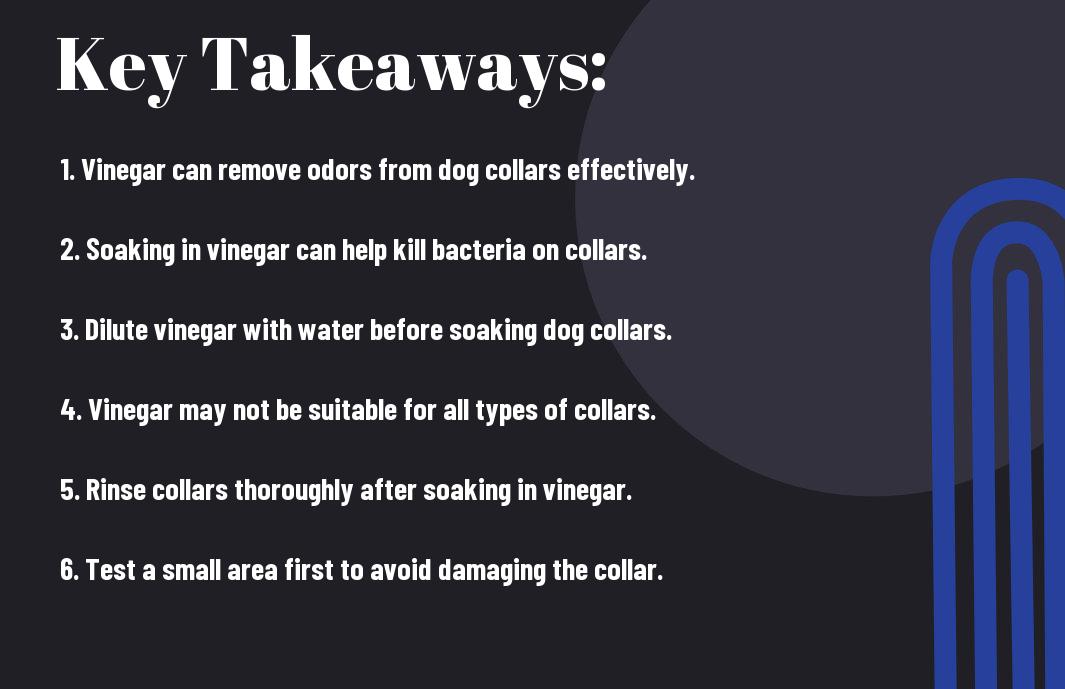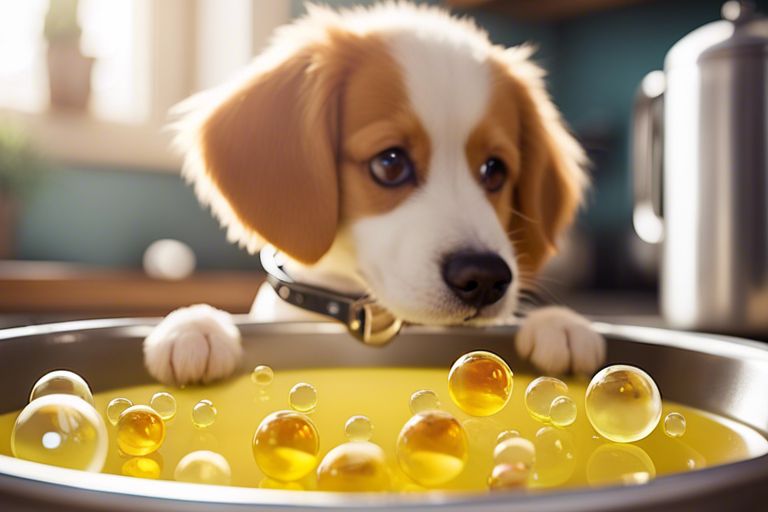Over time, your dog’s collar can accumulate dirt, grime, and bacteria, which can lead to unpleasant odors and potential skin irritations. Vinegar is a safe and natural disinfectant that can effectively cleanse and deodorize your dog’s collar. Soaking your dog’s collar in a vinegar solution can help eliminate germs and odors, keeping your furry friend clean and comfortable. However, it is important to dilute the vinegar properly and rinse the collar thoroughly to prevent any skin irritations. Read on to learn more about the benefits and precautions of using vinegar to clean your dog’s collar.
Key Takeaways:
- Vinegar can be used to clean your dog’s collar: Soaking your dog’s collar in vinegar can help remove dirt, odors, and bacteria.
- Vinegar is safe for most fabrics: Vinegar is a natural and non-toxic cleaner that is safe to use on most fabrics, including your dog’s collar.
- Properly rinse the collar after soaking: It is important to thoroughly rinse the collar after soaking it in vinegar to remove any residue and odor.
- Consult your vet for sensitive dogs: If your dog has sensitive skin or allergies, it is best to consult your vet before soaking their collar in vinegar.
- Monitor for any adverse reactions: Keep an eye on your dog after using vinegar on their collar to ensure they do not have any adverse reactions or skin irritation.


Benefits of Using Vinegar
Natural Deodorizing Properties
Little is more unpleasant than a smelly dog collar, but vinegar can be a game-changer in tackling pet odors naturally. Using vinegar to soak your dog’s collar can help neutralize and eliminate odors, leaving it fresh and clean for your furry friend to wear.
Antimicrobial Effects
Little do pet owners know, vinegar is a powerhouse when it comes to its antimicrobial effects. Vinegar has the ability to kill potentially harmful bacteria that may reside on your dog’s collar, reducing the risk of infections or skin irritation. When soaked in vinegar, your dog’s collar can benefit from an extra layer of protection.
To ensure the safety of your pet, always dilute vinegar with water before soaking the collar. This step will help prevent any potential skin irritation, especially for those pets with sensitive skin. The antimicrobial effects of vinegar can greatly benefit your pet’s overall health and well-being.
Preparing the Vinegar Soak
Choosing the Right Type of Vinegar
One important step in preparing a vinegar soak for your dog’s collar is selecting the right type of vinegar. It is recommended to use white vinegar as it is gentle yet effective for cleaning and deodorizing. Avoid using concentrated vinegars like apple cider vinegar which may be too harsh on your dog’s skin.
Creating the Soak Solution
The first step in creating the soak solution is diluting the white vinegar with water in a ratio of 1:1. This will ensure that the solution is not too strong for your dog’s skin. Once the solution is ready, submerge the collar in the mixture and let it soak for at least 30 minutes to thoroughly clean and deodorize it.
Another important tip is to rinse the collar thoroughly with water after soaking it in vinegar solution. This will help remove any residue and ensure that your dog does not experience any irritation from the vinegar. Additionally, allow the collar to air dry completely before putting it back on your furry friend.
Soaking the Collar
Unlike soaking your dog’s collar in vinegar, there are a variety of methods to remove foul smells from your dog’s gear. For more insights, check out What can I do to remove the foul smell from my dog’s harness?
Step-by-Step Soaking Process
| Step | Description |
| 1 | Fill a basin with a mixture of vinegar and water |
| 2 | Soak the collar for at least 30 minutes |
| 3 | Scrub the collar gently with a soft brush |
| 4 | Rinse the collar thoroughly with clean water |
Duration and Safety Considerations
Duration: Soaking the collar for at least 30 minutes is necessary to allow the vinegar to penetrate and neutralize odors effectively. Safety considerations: Ensure the vinegar solution is diluted to prevent any skin irritation on your dog’s neck. Always rinse the collar thoroughly to remove any residue before allowing your dog to wear it again.
Plus, avoid using vinegar on leather collars as it can damage the material. Perform a spot test on a small area of the collar to check for any adverse reactions before soaking the entire collar. Remember to air-dry the collar completely before putting it back on your furry friend.

Aftercare and Maintenance
Rinsing and Drying the Collar
Maintenance: Despite the benefits of vinegar, it’s vital to properly rinse your dog’s collar after soaking it. Make sure to rinse thoroughly to remove any vinegar residue that could irritate your furry friend’s skin. After rinsing, allow the collar to air dry completely before putting it back on your pet to prevent any discomfort.
Ongoing Collar Care Tips
Any responsible pet owner knows that proper collar care goes beyond a one-time vinegar soak. To keep your dog’s collar in top condition and ensure their comfort, follow these tips:
- Regular cleaning: Wipe down the collar with a damp cloth weekly.
- Inspect for damage: Check the collar for wear and tear regularly.
- Rotation: Consider having multiple collars to rotate and clean regularly.
This routine maintenance can help prolong the life of the collar and keep your dog healthy and happy.
Another important aspect of ongoing collar care is to pay attention to any signs of discomfort or irritation on your pet’s neck. If you notice any redness, hair loss, or unusual behavior, it’s crucial to remove the collar immediately and consult with a veterinarian. Their well-being should always be the top priority when it comes to collar care.
Alternative Cleaning Methods
Store-Bought Solutions
Now, if you’re looking for a quick and convenient option to clean your dog’s collar, consider using store-bought solutions. Any pet store or online pet retailer will carry specially formulated pet collar cleaners that are safe for your furry friend’s skin and effective at removing dirt and odors.
DIY Alternatives
Now, for those who prefer a more natural approach, methods using household ingredients can be just as effective in cleaning your dog’s collar. Vinegar, baking soda, and mild dish soap are another great option for DIY cleaning. These ingredients are safe for your pet and can help eliminate bacteria and odors.
Summing up
Presently, soaking your dog’s collar in vinegar can help remove odors and kill bacteria, making it a safe and effective method for keeping your pet’s collar clean and fresh. Remember to dilute the vinegar with water and thoroughly rinse the collar afterward to prevent skin irritation. It is always recommended to consult with your veterinarian for any concerns about your pet’s health before trying new cleaning methods. By following these steps, you can ensure that your dog stays happy, healthy, and comfortable in a clean collar.
FAQ
Q: Can I soak my dog’s collar in vinegar?
A: Yes, you can soak your dog’s collar in vinegar. Vinegar is a natural and effective cleaner that can help remove dirt, odor, and bacteria from the collar.
Q: How should I soak my dog’s collar in vinegar?
A: To soak your dog’s collar in vinegar, mix equal parts water and vinegar in a bowl or container. Submerge the collar in the mixture and let it soak for at least 30 minutes to help loosen dirt and grime.
Q: Will vinegar remove bad odor from my dog’s collar?
A: Yes, vinegar is known for its odor-neutralizing properties. Soaking your dog’s collar in vinegar can help eliminate bad smells and leave the collar smelling fresh and clean.
Q: Is it safe to use vinegar on all types of dog collars?
A: While vinegar is safe for most materials, it’s always a good idea to spot test a small, inconspicuous area of the collar before soaking the entire thing. This will help ensure that the vinegar doesn’t cause any damage or discoloration.
Q: How often should I soak my dog’s collar in vinegar?
A: It’s generally safe to soak your dog’s collar in vinegar once a month to keep it clean and fresh. However, if your dog spends a lot of time outdoors or gets particularly dirty, you may want to clean the collar more frequently.
